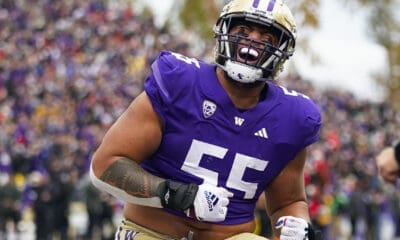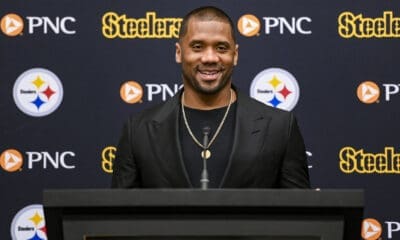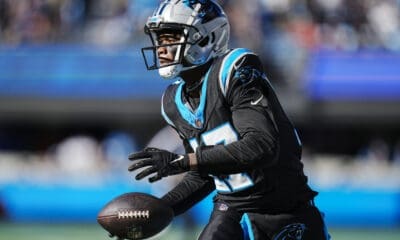Uncategorized
Interview with Former Steelers WR Malcom Johnson

Our Ron Lippock spoke with former Steelers wide receiver and 1999 fift-round draft pick Malcom Johnson about his time with the Steelers and what he’s doing post-NFL career.
First, can you let us know about your post-NFL career and how you got started?
Well, I always tell folks that having a long career in the NFL can be a blessing and a curse. I was blessed with three years in the NFL and one in the CFL. I retired at the age of 25 and lived a dream. Football was something I loved but not what I was put on this Earth to do.
After I retired I worked as a volunteer for the Pitt athletic department then decided to enroll at CMU for their MBA program. It was the best investment in myself I ever made. I gained insight into the world of finance and met some of the smartest people I had ever met in my life. It was as big of a learning experience as sitting in the Steelers locker room next to Jerome Bettis and Kordell Stewart.
And you got into finance.
I got a job first in banking – with the Bank of America in Southern California, working in real estate finance. I was there for six years and loved it. I then accepted an offer to work for JP Morgan doing the same thing and I’ve been there about seven years now working on large-scale development of things like shopping centers, apartment complexes – all across the country. It’s been a unique path but I’ve enjoyed it every step of the way.
Playing for guys like Lou Holtz, Bill Cowher and Urban Meyer helped me to ascend as quickly as I did. Football was a great stepping stone. It is all about teamwork and communication and being able to deliver. The transition was circuitous but I think it was in large part due to football that I found success as quickly as I did.
How difficult was that transition to post-NFL life?
The transition was difficult but you just have to accept that your past is over. Everywhere you go you bring your past with you. For me, I was always number 51-to-53 on the roster. My rookie season, they drafted Troy Edwards and I battled with him. The next season they drafted Plaxico Burress in round one and Hines Ward was coming into his own. Every year, it was a fight to stay on the roster. That helped prepare me for competition outside of football. There are many former players who didn’t have that kind of fight to stay on a roster and I think that’s why some struggle after football. I was prepared for that fight in the business world – I was able to transfer that competitiveness to another field. So that helped it be less difficult. You can’t teach someone to have the God-given abilities of an Antonio Brown, Ben Roethlisberger – but you can teach them the technical skills. I could learn how to be a banker and let me competitiveness help me to succeed.
Stepping back some to where it all started, were you surprised to be drafted by the Steelers?
I was elated to go to a storied franchise like Pittsburgh. I laugh with my family sometimes because a couple of guys that went after me had better careers — like Donald Driver. I thought Denver would be a potential team to take me. They liked big receivers like Ed McCaffrey and Rod Smith and had shown interest. But ultimately the Steelers called and it was a dream come true, to be able to continue my career beyond Notre Dame with a franchise that had a reputation and fan base like Notre Dame did.
Did anyone help take you under their wing as a rookie and show you the ropes, on and off the field?
Two guys come to mind. I always looked up to guys like Levon Kirkland, Bettis and Kordell. Anyone who comes to the NFL is lying when they say they first don’t come in as fans of some of the players. For a moment in the locker room I was looking at guys like Bettis and Kordell that I was watching on TV for years. But then you realize they are playing for their jobs and the team now just like you are.
Jerome took me under his wing first and told me that as a player you only get 17 paychecks a year. If you make it to the next season — and he was clear on the if — then you only get another 17. If you make it. So he told me I should be sure to budget my entire year around those paychecks. Prepay my rent, car insurance, my offseason travel. … This was a guy that was the highest paid player on the team at the time and that’s what he was doing. So I knew that was sound advice. It was very real and tempered with those “ifs”. That helped me a lot.
My brother to this day — Joey Porter — he and I came into the league together. We had a special bond. We both played for Urban Meyer and loved him. Joey was one of the few guys that was already married. He had a kid and another one on the way. He had a maturity that belied his age. He was a natural leader and the best of teammates. You always felt safe around him. That’s just how he carried himself. I remember when he first came to the Steelers and they asked if he wanted to wear number 95, Greg Lloyd’s old number. Some guys would have said yes and would have wanted to carry on that tradition. Joey said he didn’t want to disrespect Greg’s legacy and wanted to forge his own path and earn respect based on who he was. I took a lot of that with me. I always tried to forge my own path.
Any good stories you remember of your time in Pittsburgh?
I think the things most guys will tell you is that the game you lose you remember more than the big wins.
We really had a team environment. I remember Amos Zereoue, he was a very proud guy. He was the big man on campus at West Virginia. As rookies though, we all had to bring breakfast for the vets on the Saturday walk-throughs. We had to do it for the receivers, and Amos had to for the running backs – Bettis, Richard Huntley and Jon Witman. Well, one day Amos got fed up with it.
Midway through the season one a Saturday walk-through, Amos decided he wasn’t going to bring in a breakfast. We told him, the vets wouldn’t be happy with him. Well, Jerome came in and saw the receivers eating breakfast and looked over and saw there was no breakfast for the running backs. He asked Amos where breakfast was and Amos said he didn’t bring it, and he’s not going to now either! Well, the vets all took Amos’ clothes and threw them in the hot tub. All the guys thought it was funny except him. He was firecracker hot! So he asked us to help him fight those guys, to back him up. We told him we’d help defend him but nothing came to blows fortunately. It was a heated moment, but Amos did bring breakfast the next week!
We were all brothers in the end. Their retribution was throwing his clothes in the hot tub and forcing him to take them to the dry cleaners and to go home in his Steelers sweatpants. Those are the kinds of things you remember after 17 years being out of football. The long plane rides, practices, those are the memories you never forget. You miss those things the most.
I also remember Jon Witman told us to be safe when we were driving on I-70, that there were a lot of deer on the road. He told us that if we ever hit one, not to call the authorities – to call him. He told us he’d eat the deer meat. We all looked at him and weren’t sure if he was serious or not at first, but he was!
Any other thoughts before I let you go?
I really appreciate your doing this. Today, with social media, fans get to know players more as humans. As fathers, business people, people in the community. These stories help show players as just anyone – that players are just like the fans. That makes the bond more special between players and fans.
I remember watching a fantasy football show and they talked about a guy tearing his ACL and the effect it had on fantasy football value. It was cold. Nothing about the pain for the player — physically and emotionally. You’re helping humanize players. We’re dads, husbands … people.














